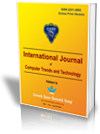Unusual Framework for Fault Tolerant in a Cloud Habitat utilizing ACO Algorithm

Virendra Singh Kushwah, Sandip Kumar Goyal "Unusual Framework for Fault Tolerant in a Cloud Habitat utilizing ACO Algorithm". International Journal of Computer Trends and Technology (IJCTT) V43(3):151-155, January 2017. ISSN:2231-2803. www.ijcttjournal.org. Published by Seventh Sense Research Group.
Abstract -
In today`s time, a distributed computing model requires overseeing loads from the different datacenters. In any case, it is difficult assignment to manage deal with the heaps. Since, there are many issues, which are prepared to welcome issues into the mists or datacenters. It is very much characterized that there are numerous predefined calculations to deal with the issues and those are perceived by fault tolerant calculations. Yet, there are couple of calculations, which cannot manage the deficiencies. In spite of the way that, there are various frameworks which are used to get the best possible occurs for persevering through the issues. Adaptation to non-critical failure implies a technique to framework outline that allows a framework to continue performing really, when one of its parts crashes and burns or it can be characterized as limit of a framework to respond agilely to a surprising gear or programming separate. If not operational, adaptation to non-critical failure arrangements may permit a framework to keep working at lessened limit as opposed to closing down totally taking after a disappointment. Along these lines, to keep from such issues or faults, this paper concentrated on showing a structure of new fault tolerant calculation, which depends on Ant Colony Optimization strategy. ACO takes after its working in light of insect`s practices and which is finding the briefest way between their settlements and a wellspring of sustenance. That is by; ACO turns into a simple and valuable method.
References
[1]. Lavinia, C. Dobre, F. Pop, and V. Cristea, “A failure detection system for large scale distributed systems,” in Complex, Intelligent and Software Intensive Systems (CISIS), 2010 International Conference on. IEEE, 2010, pp.482–489.
[2]. F. Palmieri, S. Pardi, and P. Veronesi, “A fault avoidance strategy improving the reliability of the egi production grid infrastructure,” in Principles of Distributed Systems. Springer, 2010, pp. 159–172.
[3]. P. Latchoumy and S. A. Khader, "Survey on fault tolerance in grid computing", IJCSI International Journal of Computer Science Issues, vol. 2, no. 4, 2011.
[4]. M. Dorigo and C. Blum, “Ant colony optimization theory: A survey,” Theoretical computer science, vol. 344, no. 2, pp. 243–278, 2005.
[5]. R. Mishra and A. Jaiswal, “Ant colony optimization: A solution of load balancing in cloud,” International Journal of Web & Semantic Technology (IJWesT), vol. 3, no. 2, pp. 33–50, 2012.
[6]. S. Banerjee, I. Mukherjee, and P. Mahanti, “Cloud computing initiative using modified ant colony framework,” World academy of science, engineering and technology, vol. 56, pp. 221–224, 2009.
[7]. K. Li, G. Xu, G. Zhao, Y. Dong, and D. Wang, “Cloud task scheduling based on load balancing ant colony optimization,” in Chinagrid Conference (ChinaGrid), 2011 Sixth Annual. IEEE, 2011, pp. 3–9.
[8]. A. Zhou, S. Wang, Q. Sun, H. Zou, and F. Yang, “Ftcloudsim: A simulation tool for cloud service reliability enhancement mechanisms,” in Proceedings Demo & Poster Track of ACM/IFIP/USENIX International Middleware Conference. ACM, 2013, p. 2.
[9]. M. Tawfeek, A. El-Sisi, A. E. Keshk, F. Torkey et al., “Cloud task scheduling based on ant colony optimization,” in Computer Engineering & Systems (ICCES), 2013 8th International Conference on. IEEE, 2013, pp. 64–69.
[10]. J. Sun, S.-W. Xiong, and F.-M. Guo, “A new pheromone updating strategy in ant colony optimization,” in Machine Learning and Cybernetics, 2004. Proceedings of 2004 International Conference on, vol. 1. IEEE, 2004, pp. 620–625.
[11]. P. Mathiyalagan, S. Suriya, and S. Sivanandam, “Modified ant colony algorithm for grid scheduling,” IJCSE) International Journal on Computer Science and Engineering, vol. 2, no. 02, pp. 132–139, 2010.
[12]. A. Liu and Z. Wang, “Grid task scheduling based on adaptive ant colony algorithm,” in Management of e-Commerce and e-Government, 2008. ICMECG’08. International Conference on. IEEE, 2008, pp. 415–418.
[13]. M. MadadyarAdeh and J. Bagherzadeh, “An improved ant algorithm for grid scheduling problem using biased initial ants,” in Computer Research and Development (ICCRD), 2011 3rd International Conference on, vol. 2. IEEE, 2011, pp. 373–378
[14]. K. Kousalya and P. Balasubramanie, “To improve ant algorithm’s grid scheduling using local search.” International Journal of Intelligent Information Technology Application, vol. 2, no. 2, 2009.
[15]. C.-W. Chiang, Y.-C. Lee, C.-N. Lee, and T.-Y. Chou, “Ant colony optimisation for task matching and scheduling,” in Computers and Digital Techniques, IEE Proceedings-, vol. 153, no. 6. IET, 2006, pp. 373–380.
[16]. W.-N. Chen and J. Zhang, “An ant colony optimization approach to a grid workflow scheduling problem with various qos requirements,” Systems, Man, and Cybernetics, Part C: Applications and Reviews, IEEE Transactions on, vol. 39, no. 1, pp. 29–43, 2009.
[17]. W.-N. Chen, J. Zhang, and Y. Yu, “Workflow scheduling in grids: an ant colony optimization approach,” in Evolutionary Computation, 2007. CEC 2007. IEEE Congress on. IEEE, 2007, pp. 3308–3315.
[18]. Y. Hu, L. Xing, W. Zhang, W. Xiao, and D. Tang, “A knowledge-based ant colony optimization for a grid workflow scheduling problem,” in Advances in Swarm Intelligence. Springer, 2010, pp. 241–248.
[19]. X. Wen, M. Huang, and J. Shi, “Study on resources scheduling based on aco allgorithm and pso algorithm in cloud computing,” in Distributed Computing and Applications to Business, Engineering & Science (DCABES), 2012 11th International Symposium on. IEEE, 2012, pp. 219–222.
[20]. E. Pacinia, C. Mateosb, and C. G. Garinoa, “Balancing throughput and response time in online scientific clouds via ant colony optimization,” Advances in Engineering Software. In press. Elsevier, 2014.
[21]. Zhan, Zhi-Hui, et al. "Cloud computing resource scheduling and a survey of its evolutionary approaches." ACM Computing Surveys (CSUR) 47.4 (2015): 63.
Keywords
Framework, Cloud Computing, Fault Tolerant, ACO, Algorithm.


